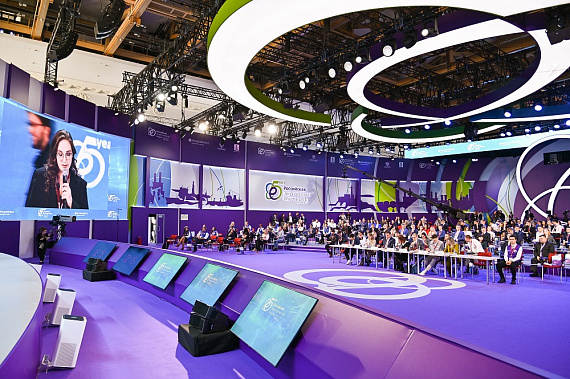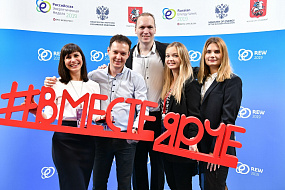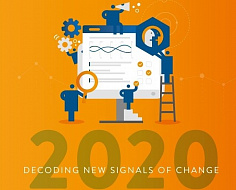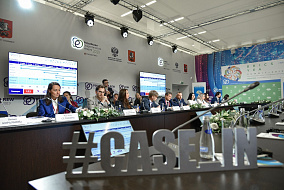Youth Day at REW 2022: New Import Substitution Ideas and Global Energy Devel-opment Forecast

Over one thousand young professionals, students and schoolchildren participated in the Youth Day that summed up the Russian Energy Week 2022 International Forum in Moscow. The organizers were the Ministry of Energy of the Russian Federation, the Roscongress Foundation, the Government of Moscow, the Russian Znanie Society, and the Smena Foundation. The Youth Day was co-organized by the Federal Agency for Youth Affairs (Rosmolodezh).
The key guest of the Youth Day was Alexander Novak, Deputy Prime Minister of the Russian Federation, who discussed energy trends with future and current professionals and listened to their ideas on the development of Russia’s fuel and energy industry.
“Today I would distinguish three global energy trends: the first is the acute energy crisis, which in fact affects energy security; the second is the global transformation of the energy market; the third is the energy transition, where we are seeing a reassessment of the pace and goals,” shared Alexander Novak at the panel discussion of key issues of the global energy, organized by the Znanie Society.
The platform of the Znanie Society has traditionally become a place for dialogue between young people and industry leaders. “Everyone has an opportunity to talk and ask questions to the heads of leading companies in the fuel and energy sector, as well as share their ideas, projects and get feedback from the professionals,” said Maxim Dreval, General Director of the Russian Znanie Society.
One of the points of attraction at the Youth Day was the REN Cup, an engineering case competition under the auspices of the CASE-IN International Engineering Championship. Young specialists from industry companies presented their ideas on import substitution and cooperation to ensure the sustainable operation and development of fuel and energy facilities and main grid companies. The winners of the CASE-IN championship were the teams of Gazprom Neft (1st place), T Plus (2nd place), and R&D Centre of FGC UES (3rd place).
“Many thanks to the largest companies in the industry who sent teams to participate in the Cup. In my opinion, this is an indicator that companies are really interested in their own development. Regardless of who wins, I am convinced that the solutions will be further developed and implemented,” said Alexey Agafonov, First Deputy General Director of Russia – Land of Opportunity.
Traditionally, the Youth Global Energy Development Forecast was presented at the REW Youth Day. Since 2017, students and young professionals have been forming the strategy of the industry development until 2035, taking into account the regulation of the fuel and energy industry and the Energy Strategy of Russia. In the new season of the project, the contestants analysed their choice of topics relevant to the Russian and global energy sector: key technologies of Industry 4.0 in the fuel and energy complex, domestic waste management through the launch of waste incineration power plants, digital solutions in transportation, carbon dioxide capture and burial technologies and others.
Another annual event of the REW Youth Day is the round table ‘Fuel and Energy Complex for Youth’, where they discuss the issues of shaping the industry’s youth policy. The participants together with the heads of the sectoral companies summed up the results of work with young people in 2022, talked about the most effective federal projects for young professionals and students, and shared their experience in implementing the corporate youth policy in a changing environment.
“Over the last three years, the share of young people in the overall structure of the FEC has decreased by 3%. According to statistics, the FEC now employs 27% of young people, with the average age of those working in the industry being around 42. Now the employer must not only attract, but also retain young people, which is very difficult. In this regard, many companies are focusing on targeting support measures, as every specialist needs something different: some are interested in supplementary health insurance, others in preferential housing mortgages. This tool makes it possible to attract young people in groups. And young people, in turn, need to study company policies, go to official websites, compare, and choose the best ones for employment,” shared Anastasiya Bondarenko, State Secretary, Deputy Minister of Energy of the Russian Federation.
According to Grigory Gurov, Deputy Minister of Science and Higher Education of the Russian Federation, the Ministry annually carries out and supports a range of activities to promote engineering and technology education.
Head of the ‘Rosmolodezh. Business’ track Alexey Rvachev believes: “The youth of the FEC are bright personalities, they have a lot of energy, a lot of project activity is initiated from within – this is very valuable. Together with our colleagues from the Russia – Land of Opportunities platform, this year we launched More Than Work. With the help of the state subsidy young people have an opportunity to travel to Russian cities, visit large enterprises, understand that most of them, especially in the fuel and energy sector, are technologically advanced, that they require engineering staff. There are many opportunities, many interesting tasks, this is an opportunity to communicate with the team, to understand whether young people are satisfied with the proposed working conditions, the infrastructure of the city or not.”
The event ended with the awarding of universities and companies that implemented the best projects and practices for working with young people in 2022. These included Gazprom, RusHydro, SIBUR Holding, Rosseti, Saint Petersburg Mining University, National Research University MPEI, Saint Petersburg Peter the Great Polytechnic University, Kazan State Energy University, National Research Technological University MISIS, and others.
Among the major competitions during the Youth Day, the finals of the 2nd IT Championship of the oil industry should also be mentioned. This year, both specialists from oil companies and students of specialized universities joined the project, with 12 of the 60 participating teams making it to the finals.
“The teams developed a model integration solution for oil company information ecosystems and an MVP prototype digital system for seamless communication between oil company employees and contractors. By interacting with the business, listening to the advice of industry experts, and getting to know the IT community, the participants gain important skills and produce an exceptionally relevant product,” said Eduard Sheremettsev, Deputy Minister of Energy of the Russian Federation.
Promotion and implementation of joint youth energy research and joining efforts to develop effective solutions to combat climate change on the eve of the 27th UN Climate Conference was discussed at the BRICS Youth Energy Agency meeting. The Youth Day ended with the traditional final session Energy of Youth Initiatives 2023, where students and young professionals presented the best technological and social projects developed during the interactive sessions.





